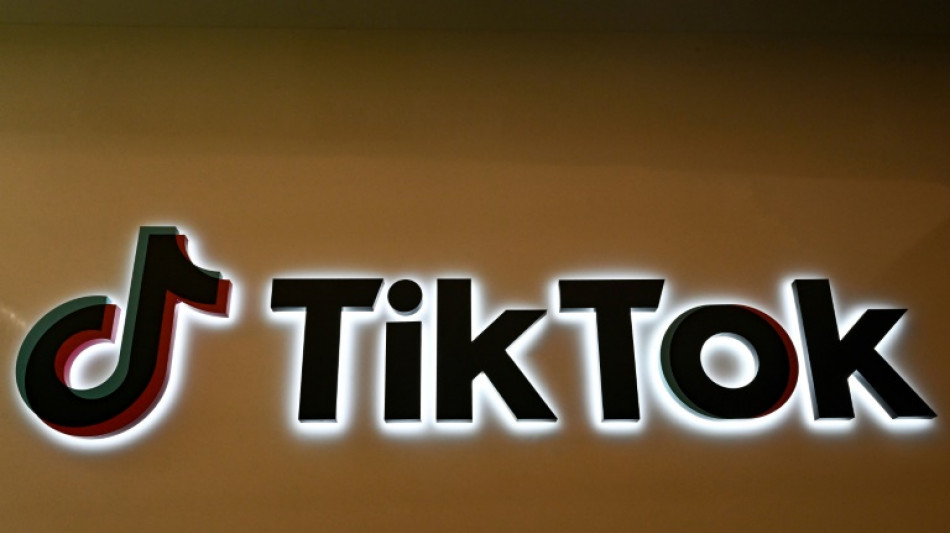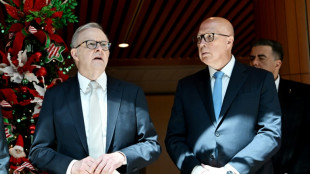
EU fine: TikTok's latest setback

The massive EU fine against TikTok on Friday marks the latest setback for the popular Chinese-owned social media platform, which has more than one billion users.
Here is a closer look at TikTok:
- Born in China -
TikTok's surge from niche video app to global powerhouse is one of the most significant shifts in digital entertainment since the advent of social media.
From teenage dancers to grandmothers sharing cooking tips, TikTok can transform ordinary users into global celebrities virtually overnight, revolutionizing the traditional path to stardom.
Originally launched in 2016 by Chinese tech company ByteDance as Douyin for the Chinese market, the international version TikTok was released in 2017.
It gained massive momentum after merging with Musical.ly, a lip-synching app, a year later.
- Secret sauce -
The secret sauce to the app's rapid expansion was its innovative recommendation algorithm.
Unlike other platforms that primarily showed content from accounts users already follow, TikTok's "For You" page served content based on viewing habits, engagement patterns and sophisticated content analysis.
A video from a complete unknown can reach millions if the algorithm determines it is engaging enough.
Its short-form video also helps keep users hooked.
Initially limited to uploads of 15 seconds, this was later expanded to up to 10 minutes. Videos as long as 60 minutes are currently being tested.
- Political suspicions -
TikTok's power to direct mass attention means its rise has not been without controversy, mainly for its Chinese ownership and the site's built-in unpredictability.
The platform has faced intense scrutiny from governments worldwide, particularly in the United States, over data privacy and potential ties to the Chinese government -- including accusations of spying and propaganda.
In 2020, India permanently banned TikTok along with other Chinese apps, citing national security concerns.
In Romania, authorities believe a Russian influence campaign through platforms including TikTok helped far-right candidate Calin Georgescu take the lead in the first round of the nation's presidential election in November.
Georgescu was excluded from a re-run of the poll after the first ballot was cancelled by the Constitutional Court.
Georgescu ally George Simion, leader of the far-right AUR party, has emerged as the favourite to win the new election on Sunday.
- Big fine -
An EU watchdog imposed a 530-million-euro ($600 million) fine on Friday, accusing it of sending personal data of Europeans to China and failing to guarantee that data was shielded from access by Chinese authorities.
It was one of the largest fines ever imposed by Ireland's Data Protection Commission (DPC), which acts on behalf of the European Union as TikTok has its European headquarters in the country.
The Chinese-owned social media giant, which is also in the crosshairs of the United States, acknowledged during a probe that it had hosted European data in China, contrary to a previous denial, according to the DPC.
- Fears for teenagers -
In March, Albania ordered all internet providers to block TikTok after a 14-year-old schoolboy was killed and another hurt in a brawl in the capital Tirana following a social media clash.
Other jurisdictions have also expressed fears about the potential effects of TikTok on young users. There have been accusations it funnels them into echo chambers and fails to contain illegal, violent or obscene content.
Britain's data regulator has opened investigations into social media including TikTok on how the platforms use data from children and teens.
Australia notably banned access to social media for all under-16s late last year.
In France a group of families is taking legal action against TikTok, accusing the network of showing their children content that could have encouraged them to commit suicide.
And in late December, Venezuela fined the company $10 million for "negligence" over the deaths of three teenagers participating in a dangerous online challenge.
TikTok last year withdrew a programme in its TikTok Lite app that rewarded users based on screen time.
- Sell or be banned -
The US Congress passed legislation in 2024 requiring ByteDance to divest control of TikTok in the United States or be banned from the country.
President Donald Trump has so far twice postponed the deadline for the sale of the social network, which has 170 million American users. The deadline is now set at June 19.
Trump said in early March that Washington was in talks with four groups interested in acquiring the app.
"A lot of people want it, and it's up to me," Trump said.
Trump's first administration had already attempted to force the sale of TikTok's US operations to American companies.
burs-lth/jj
F.T. Michaud--SMC


 London
London

 Manchester
Manchester
 Glasgow
Glasgow
 Dublin
Dublin
 Belfast
Belfast
 Washington
Washington
 Denver
Denver
 Atlanta
Atlanta
 Dallas
Dallas
 Houston Texas
Houston Texas
 New Orleans
New Orleans
 El Paso
El Paso
 Phoenix
Phoenix
 Los Angeles
Los Angeles



